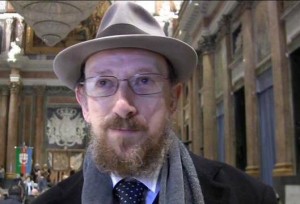NEWS President of Italian Rabbinical Assembly Speaks Ahead of Bergoglio’s visit
 By Adam Smulevich and Rossella Tercatin
By Adam Smulevich and Rossella Tercatin
On January 17, Jorge Bergoglio will visit the Synagogue of Rome, marking the third visit of a pope to the synagogue since the first landmark visit by John Paul II in 1986.
“The situation is very different from a few decades ago. It would be erroneous to deceive ourselves that problems no longer exist. However, we have to acknowledge that the Church is making a sincere effort and this represents an excellent premise,” president of the Italian Rabbinical Assembly rav Giuseppe Momigliano told Pagine Ebraiche, discussing the relationship between Christianity and Judaism ahead of the visit.
Rav Momigliano stressed the importance of self-awareness in approaching interfaith dialogue.
“Without self-awareness, without a deep knowledge of our own roots, dialogue does not go anywhere. Dialogue does not mean reciprocal cancellation or nuancing the differences between the parties. The uniqueness of every religious experience is a value to be preserved, a value that makes everyone richer,” he added.
The rabbi asked an effort be made to bring all religions back at the heart of public discourse and of the challenges that this current time is presenting to all humanity, from social emergencies to the protection of the environment, not forgetting terrorism and the necessity for asking moderate Muslims to speak up against the horror.
Regarding the latest document concerning the relationship with Judaism issued by the Vatican a few weeks ago, rav Momigliano said he will promote a discussion about it within the Rabbinical Assembly to analyze the text in a deeper way. While he reiterated his perplexity about the theological document issued a few days later by a group of Modern Orthodox rabbis stressing the theological mission of Christians and Jews to work together for a better world.
“I understand the spirit in which it was written. But I’m not persuaded it was an effective step. The theological perspective is always dangerous and divisive, it is not the first time this is happening. It is better to focus on issues about which the cooperation between Christians and Jews can lead to something concrete. That said, among the signatories, there are prominent and qualified rabbis. However, in many cases, they acted in a personal capacity, rather than in their institutional roles.”
The upcoming visit of the Pope should be considered “a sign of the fact that dialogue can never be taken for granted, but rather it comes from an effort that has to be displayed every day.”
The January issue of Pagine Ebraiche also runs a column by Giovanni Maria Vian, the editor in chief of Osservatore Romano, the Holy See official paper and an interview with Lucio Brunelli, the director of Catholic TV channel TV2000.
